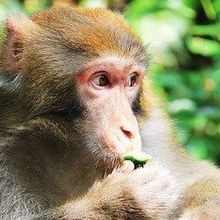Login
Subscribeevolutionary biology, evolution

Do Pathogens Gain Virulence as Hosts Become More Resistant?
Andrew F. Read and Peter J. Kerr | Oct 1, 2017 | 10+ min read
Emerging infections provide clues about how pathogens might evolve when farm animals are protected from infection.

Infographic: Evolving Virulence
Andrew F. Read and Peter J. Kerr | Sep 30, 2017 | 2 min read
Tracking the myxoma virus in the wild rabbit populations of Australia has yielded insight into how pathogens and their hosts evolve.

Pollution Drives Marine Reptile Color Change
Bob Grant | Aug 11, 2017 | 2 min read
The turtle-headed sea snake is losing its stripes, and researchers suggest that the change reflects adaptation to fouled oceans.

Islands North of Antarctica Key to Fish Species Diversity
Shawna Williams | Jul 24, 2017 | 1 min read
Their waters served as refuges during ice ages, allowing for adaptation and the emergence of new species.

Mammalian Jaws Evolved to Chew Sideways
Catherine Offord | Jun 1, 2017 | 4 min read
Parallel evolution in jaws and teeth helped early mammals diversify their diets.

Study: Fishing Induces Gene Expression Changes
Jef Akst | May 18, 2017 | 2 min read
Harvesting lab-raised zebrafish based on their size led to differences in the activity of more than 4,000 genes, as well as changes in allele frequencies of those genes, in the fish that remained.

Evolution’s Quick Pace Affects Ecosystem Dynamics
Jef Akst | May 1, 2017 | 10+ min read
From fish harvests to cottonwood forests, organisms display evidence that species change can occur on timescales that can influence ecological processes.

Study: Diet Contributes to Brain Size
Diana Kwon | Mar 29, 2017 | 2 min read
The results of a historical primate behavior analysis suggest that species with fruit-filled diets evolved larger brains.

Dinosaur Phylogenetic Tree Shake-Up
Jef Akst | Mar 24, 2017 | 2 min read
An analysis of 74 dinosaur species leads a group of researchers to reorganize the extinct animals’ evolutionary history.

Understanding the Roots of Human Musicality
Catherine Offord | Mar 1, 2017 | 10+ min read
Researchers are using multiple methods to study the origins of humans’ capacity to process and produce music, and there’s no shortage of debate about the results.

Adaptation, Island Style
The Scientist | Jan 2, 2017 | 1 min read
Anole lizards inhabiting the Caribbean islands display some of the key principles of evolution.

Caribbean Anoles Function as Model Organisms for Evolutionary Dynamics
Amber Dance | Jan 1, 2017 | 4 min read
The small lizards adapted to unique niches among dozens of isles.

How an Invasive Bee Managed to Thrive in Australia
Ben Andrew Henry | Jan 1, 2017 | 4 min read
The Asian honeybee should have been crippled by low genetic diversity, but thanks to natural selection it thrived.

Week in Review: October 17–21
Jef Akst | Oct 20, 2016 | 2 min read
Report finds that pathologist involved in anonymous defamation case committed multiple acts of misconduct; growing eggs from stem cells; neutrophils’ role in metastasis; convergent evolution in birds

Single-Celled Life Primed to Go Multicellular
Bob Grant | Oct 17, 2016 | 2 min read
The unicellular ancestor of animals may have harbored some of the molecular tools that its many-celled descendants use to coordinate and direct cell differentiation and function, scientists show.

Week in Review: September 5–9
Jef Akst | Sep 8, 2016 | 2 min read
Environmental magnetite in the human brain; prion structure takes shape; watching E. coli evolve in real time; learning from others’ behavior

Using RNA to Amplify RNA
Abby Olena, PhD | Aug 15, 2016 | 3 min read
Researchers apply in vitro evolution to generate an RNA enzyme capable of copying and amplifying RNA.

On Becoming Human
Mary Beth Aberlin | Aug 1, 2016 | 3 min read
Some thoughts on going to the Galápagos

Opinion: Monogamy and Cooperation Are Connected Through Multiple Links
David F. Westneat and Jacqueline R. Dillard | Aug 1, 2016 | 4 min read
Why does cooperation evolve most often in monogamous animals?

Opinion: Our Inner Caveman
João Pedro de Magalhães | Aug 1, 2016 | 4 min read
The modern human brain evolved in social and environmental settings very unlike today’s. Despite our cultural and technological progress, tribal instincts remain.